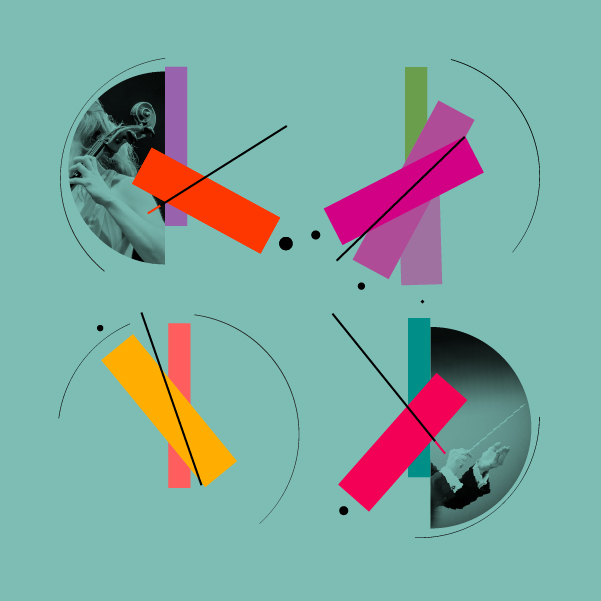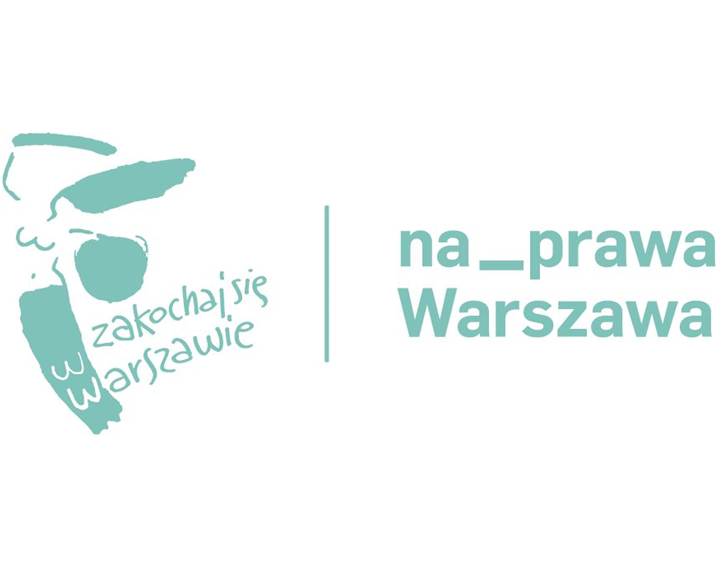

This year's 22nd edition of the Sinfonia Varsovia to its City Festival will revolve around movement. Reality has provided and continues to provide countless reasons for exploring this topic. Movement as an answer to stillness in a pandemic. Body movement as a remedy for the mind and the body. Possibility of movement in space – freedom of movement. The steady and changing rhythm of life – the freedom to stop and then start again.
The Festival’s program approaches this theme in a variety of ways. The concert of 7 June will feature stylized dance forms and ballet music by Claude Debussy and Maurice Ravel. Ostinato forms and minimal music are also evocative of movement as manifested in pieces by Philip Glass, Simeon ten Holt, Gavin Bryars, and Mikołaj Majkusiak, which we will hear on 7, 19, 27, and 28 June. The themes of journey and wandering are also depicted in the Prague and Rhenish Symphonies, which will be performed on 28 June, as well as in the Don Quixote Suite, which will be presented on 14 June. Movement can also be understood as a tension between nature and civilization as reflected in the concert of 7 June featuring works by Debussy and Honegger. The contrast between frenetic movement and the silence of the landscape will reveal itself in the juxtaposition of Serocki’s and Panufnik’s music on 14 June. On 11 and 12 June, the Norwegian Weekend will take us on a musical journey into the homeland of Edvard Grieg – we will be guided by Little Basil during the family concert on 11 June and talented young Norwegian musicians during the chamber concert on 12 June.
The theme of movement is also present in the program of meetings and workshops "My Body – My Place – My Music". The series will encourage participants to make a move towards self-development. No musical skills are needed to participate in the program of 26 meetings, including physical exercises grounded in movement culture and various percussion and vocal workshops; the aim is to spend good, enjoyable time together.
The above-mentioned themes have recently been complemented by a painful real-life scenario, as movement may also refer to escape or migration. That is why we have included the Ukrainian Weekend on 25-26 June in the Festival’s program. The four concerts: family, jazz, electronic, and chamber music, will feature primarily Ukrainian musicians. These events are intended for both new Ukrainian and Polish audiences, showcasing the rich musical culture of our neighbors.
This year's program has been expanded to include participatory workshops and engaging concerts, which are not classical in character. There is something for everyone, just make the first move!
Orchestral concerts
Two out of three orchestral concerts – the opening (7 June) and closing ones (28 June) – will be conducted by Aleksandar Marković. The Maestro is already well-known to Warsaw audiences and will become the principal guest conductor of the Orchestra in September this year. The Festival's main theme – movement – will manifest itself in performances of large ensembles led by the conductor. This year marks the 50th anniversary of the Polish Chamber Orchestra. Its founder, Jerzy Maksymiuk, will conduct Sinfonia Varsovia on 14 June in a program that will takes us back to the beginnings of the Polish Chamber Orchestra (Mozart, Telemann). Moreover, it will feature new interpretations, including Kazimierz Serocki's unique Sinfonietta written for two competing (and cooperating) string orchestras.
Chamber concerts
Our Sunday chamber music concerts will celebrate string instruments. The concert of 12 June will feature exceptional young chamber musicians from Norway and Poland, who will present pieces by Grieg and Svendsen. The Norwegian artists will also perform a jewel of 19th-century Polish chamber music, Juliusz Zarębski's Piano Quintet. The composer, born in Zhytomyr located in present-day Ukraine, links together the Norwegian and Ukrainian concerts, which will take place on 26 June. Ukrainian performers continue their artistic path beyond their nation’s borders – in Poland, Germany, and France. The rich program will include pieces by contemporary composers (Almashi, Bezborodko), a string quartet by Borys Lyatoshynsky, the father of modern Ukrainian music and a violin sonata by "Ukrainian Mozart" – Maxim Berezovsky.
Family concerts
Little Basil, a cheerful, musical dragon and a friend of Sinfonia Varsovia musicians, is back! He will appear in two different concerts. On 11 June, he will reveal the secrets of the Norwegian traditional Hardanger fiddle and will learn different ways of playing string instruments. He will be joined by the Dragon Strings, a string orchestra made up of Sinfonia Varsovia musicians, who will perform works by Edvard Grieg. The strings are what dragons like the most! On 25 June Little Basil will host a special concert – his Musical Bench. There is enough space for all – Poles and Ukrainians, wooden and brass instruments, the young and the old. Whoever sits on it, immediately invites the others: come and sit down, listen to music, we'll find a common language!
All the other concerts
The festival will feature concerts whose character and repertoire differ from conventionally defined philharmonic music. These include two events of the Ukrainian Weekend: a performance of Kateryna Zavoloka, an artist who combines her two passions: collecting Ukrainian folk songs and exploring advanced electronic instruments (25 June), and a concert by the jazz trio Vitali Kyianytsya (26 June). On 19 June, we will also hear Simeon ten Holt's Canto Ostinato, which involves "open reception": each listener is invited to decide whether they will turn up on time for the concert (recommended!) and stay until the piece's finale. The evening of 27 June will feature the Radical Polish Arkestra, which combines experimental music with the rough sounds of folk instruments. Using this unusual instrumentation, they will perform the legendary song Jesus' Love Never Failed Me Yet by Gavin Bryars and a new piece based on Romani music by Maciej Filipczuk, fiddler and leader of the Radical Pomeranian Orchestra.
Movement workshops
Where, when, and how is music born? Perhaps it is closer than we think? Perhaps it is inside us? Let's try to find the answer. For thirteen June afternoons and evenings, we will be engaged in various musical and movement activities as well as exercises for rest, relaxation, and fun. No experience nor skills are needed – just playfulness, good mood, and openness. Together we will be rediscovering music, listening to it inside ourselves, and awakening our imaginations, senses, voices, and bodies. We encourage active participation, regardless of musical skills or physical fitness.


